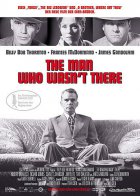
The Man Who Wasn't There Page #18
The piano music ends in a sustain which begins to fade, but
then is snapped by a sharp clang.
We are pushing into the high-windowed prison meeting room.
None of its three occupants is moving.
The tableau consists of Doris staring down at the table; the
private investigator sitting on a straightbacked chair tipped
back against a wall, his arms folded across his chest, his
fedora pushed back on his head, a toothpick clamped between
his teeth; and Freddy Riedenschneider, standing, hands clasped
behind his back, gazing with a distant smile up into the
shaft of light that slants through the high window.
A warder shuts the door behind Ed.
Doris and the private investigator turn to note his entrance;
Riedenschneider does not.
Ed pulls out a chair across from Doris, clasps his hands on
top of hers.
ED:
'Lo, honey.
She looks at his hands on top of hers.
A long beat.
Still gazing up into the shaft of light, Freddy
Riedenschneider announces:
RIEDENSCHNEIDER:
...They got this guy, in Germany.
Fritz something-or-other. Or is it.
Maybe it's Werner. Anyway, he's got
this theory, you wanna test something,
you know, scientifically--how the
planets go round the sun, what
sunspots are made of, why the water
comes out of the tap--well, you gotta
look at it. But sometimes, you look
at it, your looking *changes* it. Ya
can't know the reality of what
happened, or what *would've* happened
if you hadden a stuck in your goddamn
schnozz. So there *is* no 'what
happened.' Not in any sense that we
can grasp with our puny minds. Because
our minds... out minds get in the
way. Looking at something changes
it. They call it the 'Uncertainty
Principle.' Sure, it sounds screwy,
but even Einstein says the guy's on
to something.
His gaze up at the window breaks. He strolls around the room,
still smiling.
RIEDENSCHNEIDER:
...Science. Perception. Reality.
Doubt...
He stops to examine a bur on his fingernail.
RIEDENSCHNEIDER:
...Reasonable doubt. I'm sayin',
sometimes, the more you look, the
less you really know. It's a fact. A
proved fact. In a way, it's the only
fact there is. This heinie even wrote
it out in numbers.
He looks up at the private detective.
RIEDENSCHNEIDER:
...Burns?
With a slight weight shift, Burns tips his chair so that its
front legs slap down onto the floor. He fishes a small
notebook from an inside pocket.
His boredom is profound; his only concession to performance
is to move the toothpick from one side of his mouth to the
other where, perhaps, it will less inhibit speech.
BURNS:
Subject:
David Allen Brewster. Born:Cincinnati, 1911. Father: insurance
salesman; mother: homemaker. One
year Case Western University on
football scholarship. Flunks out.
1931:
retail appliance salesman inBarnhoff's department store,
Cincinnati. 1933: meets Ann
Nirdlinger, married later that year,
moves here. 1935: arrested on an
assault complaint; complainant, an
organizer for the ILGWU, has a broken
nose, couple of ribs, wife's family
intercedes, some kind of settlement,
charges dropped. 1936: another assault
beef, bar altercation--
RIEDENSCHNEIDER:
Yeah, yeah, couple of fistfights. Go
to his service record.
Burns looks at him sourly. He flips a couple of pages.
BURNS:
...Inducted March 15, 1942, assigned
to fifth fleet US Navy, petty officer
first class, serves in clerical
capacity in US naval shipyards in
San Diego, one fistfight broken up
by MPs, no court martial, honorable
discharge May 8, 1945. Since then
he's been clean.
Riedenschneider nods, smiling.
RIEDENSCHNEIDER:
...Thank you, Burns, get lost.
Burns pockets his notebook, adjusts his hat, jams his hands
into his pockets, and ambles out of the room.
The slam of the door leaves quiet.
At length:
ED:
...So?
Riedenschneider's fixed smile now fades.
RIEDENSCHNEIDER:
So? *So?!* This could be your dolly's
ticket out of the deathhouse, so!
Ed and Doris look at each other.
ED:
...I don't get it.
RIEDENSCHNEIDER:
Look, chum, this is a guy, from what
I understand, told everybody he was
a war hero, right? Island hopping,
practically liberated the Pacific
all by himself with a knife in one
hand and a gun in the other and twenty
yards of Jap guts between his teeth.
Translation
Translate and read this script in other languages:
Select another language:
- - Select -
- 简体中文 (Chinese - Simplified)
- 繁體中文 (Chinese - Traditional)
- Español (Spanish)
- Esperanto (Esperanto)
- 日本語 (Japanese)
- Português (Portuguese)
- Deutsch (German)
- العربية (Arabic)
- Français (French)
- Русский (Russian)
- ಕನ್ನಡ (Kannada)
- 한국어 (Korean)
- עברית (Hebrew)
- Gaeilge (Irish)
- Українська (Ukrainian)
- اردو (Urdu)
- Magyar (Hungarian)
- मानक हिन्दी (Hindi)
- Indonesia (Indonesian)
- Italiano (Italian)
- தமிழ் (Tamil)
- Türkçe (Turkish)
- తెలుగు (Telugu)
- ภาษาไทย (Thai)
- Tiếng Việt (Vietnamese)
- Čeština (Czech)
- Polski (Polish)
- Bahasa Indonesia (Indonesian)
- Românește (Romanian)
- Nederlands (Dutch)
- Ελληνικά (Greek)
- Latinum (Latin)
- Svenska (Swedish)
- Dansk (Danish)
- Suomi (Finnish)
- فارسی (Persian)
- ייִדיש (Yiddish)
- հայերեն (Armenian)
- Norsk (Norwegian)
- English (English)
Citation
Use the citation below to add this screenplay to your bibliography:
Style:MLAChicagoAPA
"The Man Who Wasn't There" Scripts.com. STANDS4 LLC, 2024. Web. 24 Nov. 2024. <https://www.scripts.com/script/the_man_who_wasn't_there_983>.



Discuss this script with the community:
Report Comment
We're doing our best to make sure our content is useful, accurate and safe.
If by any chance you spot an inappropriate comment while navigating through our website please use this form to let us know, and we'll take care of it shortly.
Attachment
You need to be logged in to favorite.
Log In